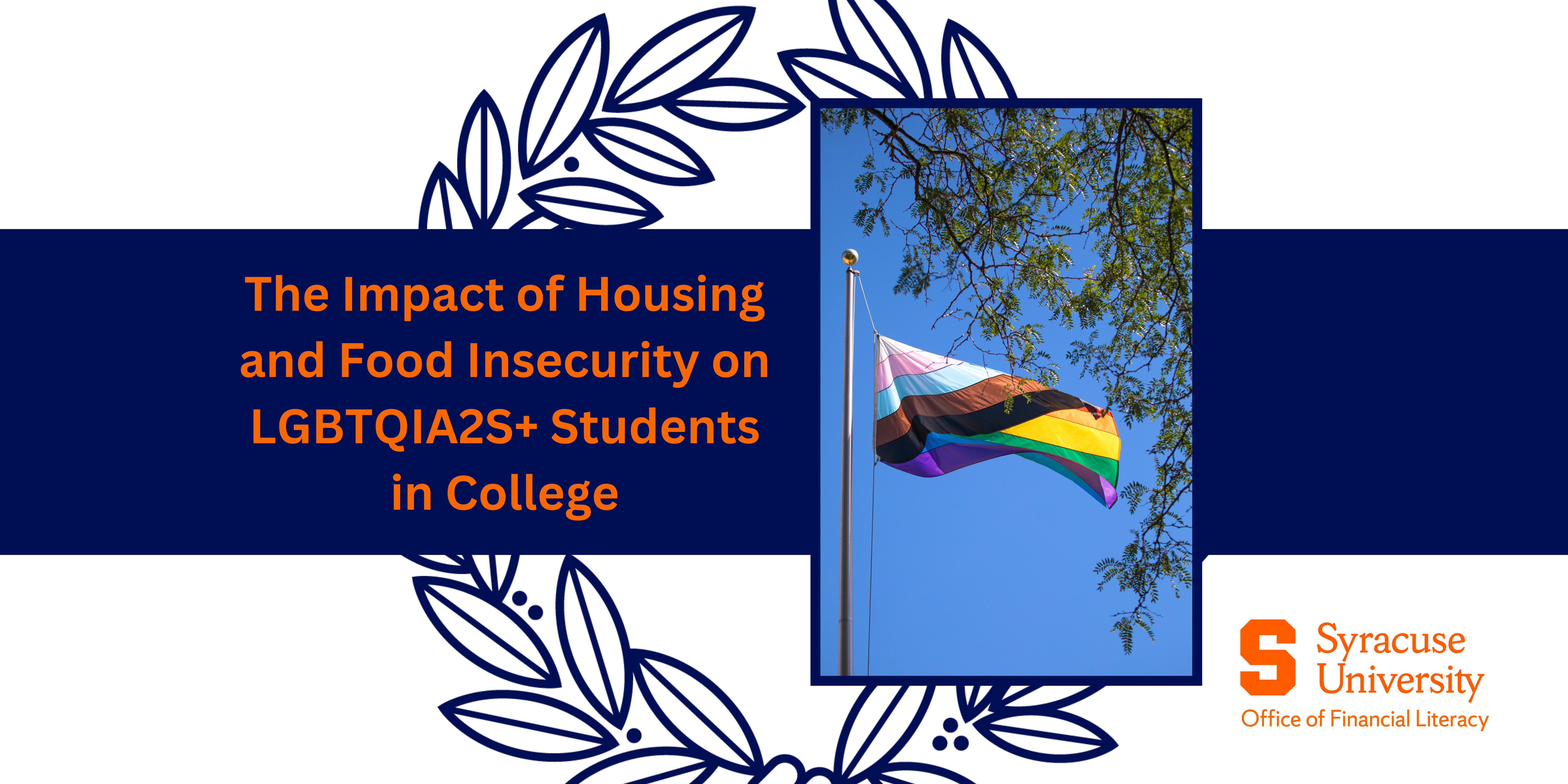By: Assistant Director, Karina Anderson; June 2024

LGBTQIA2S+ students in college face unique challenges that can exacerbate housing and food insecurity. These issues are often intertwined with trauma, impacting their financial stability and academic success. Through the Office of Financial Literacy Programs at Syracuse University, we explore how housing and food insecurity further affect LGBTQIA2S+ students and provide resources available in the Central New York region to support them.
Understanding Housing Insecurity
Housing insecurity encompasses a range of issues, from difficulty paying rent to generalized houselessness. LGBTQIA2S+ students are disproportionately affected by housing insecurity due to several factors:
- Family Rejection: Many LGBTQIA students face rejection from their families due to their sexual orientation or gender identity, leading to a loss of financial and emotional support.
- Discrimination: In both housing markets and on-campus housing, LGBTQIA students may encounter discrimination, making it difficult to secure safe and stable housing.
- Economic Disadvantages: Pre-existing economic disparities often mean that LGBTQIA students have fewer financial resources to draw upon in times of need.
From a trauma-informed financial literacy perspective, it’s crucial to understand that these students might have heightened stress and anxiety regarding their financial stability. This can impede their ability to manage their finances effectively, as the constant worry about housing can overshadow long-term financial planning and literacy efforts.
Interrogating Food Insecurity
Food insecurity is another significant issue, characterized by the lack of reliable access to enough affordable, nutritious food within an accessible distance. LGBTQIA2S+ students often experience higher rates of food insecurity due to:
- Limited Financial Resources: The economic hardships that lead to housing insecurity also contribute to food insecurity.
- Health and Safety Concerns: Discrimination and trauma can lead to mental health issues, which in turn can affect a student’s ability to work and manage their finances, exacerbating food insecurity.
- Institutional Barriers: Lack of inclusive policies and support systems in colleges can leave LGBTQIA students without adequate resources to address food insecurity.
Trauma-informed financial literacy acknowledges the compounding effects of stress from food insecurity, which can lead to difficulties in budgeting, prioritizing expenses, and seeking help.
Locating Resources in Central New York
Several resources in the Central New York region can help LGBTQIA students combat housing and food insecurity:
- Syracuse University’s LGBTQ Resource Center: This center offers support services, including emergency housing assistance and food pantry referrals, specifically tailored for LGBTQIA students.
- Syracuse University LGBTQ Resource Center
- Q Center at ACR Health: Located in Syracuse, this center provides a safe space, resources, and support for LGBTQIA youth and young adults, including assistance with housing and food insecurity.
- Vera House: This organization offers emergency shelter and support services for individuals facing domestic violence, which can be crucial for LGBTQIA students escaping unsafe living situations.
- Food Bank of Central New York: Provides food assistance through various programs and partners with local colleges to support food-insecure students.
- Onondaga Community College Student Support Services: Offers emergency grants and resources to address students’ immediate financial needs, including those related to housing and food.
Addressing housing and food insecurity among LGBTQIA2S+ college students requires a trauma-informed approach that recognizes the unique challenges they face. Financial literacy education should be tailored to their specific needs, incorporating strategies to manage stress and trauma. By leveraging resources available in Central New York, these students can find the support they need to overcome these barriers and achieve academic success.
Resources:
- Baams, L., Grossman, A. H., & Russell, S. T. (2015). Minority stress and mechanisms of risk for depression and suicidal ideation among lesbian, gay, and bisexual youth. Developmental Psychology, 51(5), 684.
- Syracuse University LGBTQ Resource Center. (n.d.). Retrieved from Syracuse University
- Q Center at ACR Health. (n.d.). Retrieved from ACR Health
- Vera House. (n.d.). Retrieved from Vera House
- Food Bank of Central New York. (n.d.). Retrieved from Food Bank of Central New York
- Onondaga Community College. (n.d.). Retrieved from Onondaga Community College
By integrating these resources and adopting a trauma-informed perspective, we can better support LGBTQIA students in achieving stability and success in their college careers.
